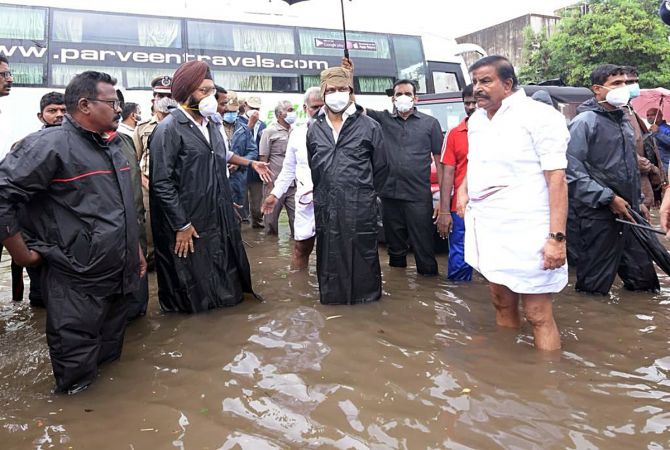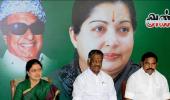With the unanticipated floods across Tamil Nadu catching the unprepared administration unawares, Stalin finds that some of the early positives that had rubbed on his initiatives have been lost, observes N Sathiya Moorthy.

With the unprovided-for monsoon rains and consequent floods washing off Chief Minister M K Stalin's deserved honeymoon with the Tamil Nadu voter, the divided leadership of the Opposition All India Anna Dravida Munnetra Kazhagam has come up with a double-quick patch-up at the top, whose procedure has been challenged in the Madras high court.
But the question is, will the self-serving hijack of the leadership hold for long or would it go the way of other patch-ups since J Jayalalitha's death in December 2016?
In a fast-tracked bid to keep Jaya's jailed confidante Sasikala from returning and 'capturing' the party by subterfuge, party coordinator O Panneerselvam (OPS) and joint coordinator Edappadi K Palaniswami (EPS) have shaken hands, but possibly still hiding their claws.
To do this, they have got the party by-laws amended to have cadre-based direct elections to the top post(s) as party founder M G Ramachandran had in his scheme, with a clause that dictated single vote for a joint election for the two top posts.
The cadres too are happy that the scheme has checked continuing competition between the top two that had contributed to the party losing power in the assembly polls of April.
But they also admit that the constitutional amendments are selfish, self-centred and self-serving the causes only of the two, to the exclusion of other aspirants.
In particular, the cadres are peeved that the two between them have grabbed the party for themselves without commanding the charismatic supremacy of MGR and Jayalalithaa.
They fear that in the name of fending off Sasikala, the two may have ended up institutionalising their eternal continuance at the helm.
In the immediate context, the first bench of the Madras high court has reserved orders on a writ petition seeking to stall the AIADMK's internal elections.
Questions include the legality of the court entertaining a writ petition under Article 236 of the Constitution, which is otherwise restricted to governments and governmental bodies.
To this end, as if, the petitioner has named the Election Commission as a respondent.
On specifics, the petition has claimed, as captured on television news cameras, how nomination papers were denied to others and some of them were beaten up at the party headquarters.
It has described the poll process as a fast-tracked farce, starting with the amendments to the by-laws, the short-notice nomination and the entire electoral process, and want them all annulled.
Even as they are not seriously concerned about the court proceedings, AIADMK cadres wonder how in the aftermath of the current patch-up, the two leaders are going to work together in the future.
There is apprehension that as coordinator, OPS would seek to assert himself, having lost out to EPS in the choice of the Leader of the Opposition in the state assembly.
However, EPS' loyalists are confident that their leader could continue to cock a snook at OPS again -- and again -- as numbers are stacked in the former's favour.
They expect EPS to use the planned bottom-up organisational elections to have his way at the top, even though the polls won't cover the top two slots.
In turn, the OPS camp is keeping fingers crossed.
Their hope, some say, is centred on the leader's ability to stitch a coalition of convenience with a third group that showed up its head at the party leadership meeting earlier in the month, seeking to take the internal discourse away from the two former chief ministers.
At the December 1 party conclave, veteran former minister K A Sengottiyan had his voice heard loud and clear, over those of the OPS and EPS camps.

Sengottiyan is senior to EPS in party affairs in the AIADMK-strong western region, and had fallen out of Jayalalithaa's favour in the years preceding her death.
He was Sasikala's choice for chief minister after she forced OPS to quit as (interim) chief minister, weeks after Jaya's death, when acting governor Ch Vidyasagar Rao refused to swear her in, pending the Supreme Court verdict in the 'Jaya wealth case', in which she was Accused-2.
At the party meet, Sengottiyan proposed to expand the 11-member inactive advisory committee to make it an 18-member panel, binding on the duo at the top.
Instant speculation was the Sengottiyan himself would be named the convenor of the panel, or wanted to be made so.
The fast-tracked by-laws amendments and the subsequent developments were aimed at scuttling his changes, or so was it argued.
The question is if in the light of the 'farcical re-election' of the duo, those like Sengottiyan would want to test their grassroots-level strength in the party polls to fill lower-level posts.
This would have a significant impact on the base of the duo, jointly and severally, in their traditional strongholds -- south for OPS and west for EPS.
There is the uncharted North, including Chennai city, where the party fared very badly in the assembly polls.
The party's perceived strongmen, former ministers D Jayakumar (Chennai) and C Ve Shanmugam (Villupuram), both lost their assembly seats.
This is partly attributed to the dominance of the PMK electoral ally in its traditional stronghold, and otherwise to the unwillingness of the party to project and promote a regional leader, like the other two.
A lot depends on the court orders, and also on the way OPS and EPS gel at least from now on -- whether or not they accommodate the aspirations of other veterans and seniors.
To avoid an early showdown, it is likely that the party will decide to postpone the lower-level organisational polls, citing impending urban local bodies elections, which are due by early next year.
The party has everything to gain by stitching up an inclusive unity at all levels and involving all factions, from the district-level up.
With the unanticipated floods across the state catching the unprepared administration unawares, Stalin finds that some of the early positives that had rubbed on his administrative initiatives have been lost.
Apart from original ideas like the appointment of a chief minister's economic advisory council, which found all-round welcome, the government's handling of the Covid situation from the first day in office, or even before it, won kudos from the public.
But the floods situation saw the chief minister and only a few other ministers at work.
Some veterans were happy with the photo op with Stalin in Chennai city, which was among the worst-hit, but without supervising the relief work in their native districts and constituencies.
Most party MPs and MLAS too were conspicuous by their absence.
Some attributed it to the chief minister's strict instructions for them not to unduly interfere with official relief work.
But cadres and common voters point out how elected representatives could still have coordinated the relief efforts, and helped those in need.
If nothing else, their presence in the flood-affected areas in their own constituencies and neighbourhoods would have come as a morale-booster for their cadres and constituents alike.
This, apart from the unjustifiable perception of the tardy handling of the unprecedented floods can have its reflection in the urban council polls.
The urban polls cover all 21 municipal corporations and 152 councils, where mostly the DMK alliance had won the assembly elections.
In context, it can end up as a referendum on the performance of the Stalin leadership -- and hence, as much critical for the AIADMK Opposition as it is crucial for the ruling DMK.
N Sathiya Moorthy, veteran journalist, political analyst and author, is Distinguished Fellow and Head-Chennai Initiative, Observer Research Foundation.
Feature Presentation: Aslam Hunani/Rediff.com











 © 2025
© 2025